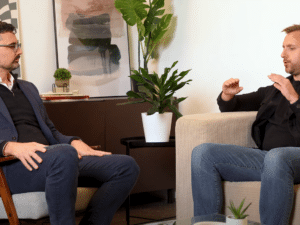View from the top – Todd Winkleman at Nature’s Bakery
In our most recent edition of “View from the top”, we interview Todd Winkleman, Vice President of People at Nature’s Bakery.

What are you really, really good at?
As businesses inevitably expand or contract, I have become very skilled at navigating business transformations. More times than not, business transformations may not incorporate HR implications into the overall thinking. As an HR leader, it is important to highlight this gap and partner with an organization to close the gap. These moments require a skilled HR leader to work through the organizational design, communication plan, and the change management activities to ensure the transformation is a success. While these are important components in a business transformation, it is equally important to ensure the transformation can be sustained. This is where HR leaders need to be savvy enough to understand how the interrelated components of an organization support transformations. Specifically, the talent acquisition strategy, rewards and recognition programs, talent development programs, and performance management strategy should all be reviewed and adapted to support the transformation. These are key levers that can help reinforce the desired future state your business transformation is trying to achieve.
What do you predict will be the major trends impacting talent acquisition and management over the coming year?
The pandemic seemed like it broke the norms of talent acquisition and talent management as everyone was just trying to be able to run their businesses. As we have turned the page, I think there will be a return to basic fundamentals and better process discipline. HR teams will need to focus on the “right people with the right skills at the right time”. In practicality, this means a renewed focus (or in some cases a relaunch) of all aspects of strategic workforce planning. One model for strategic workforce planning has four key components:
- Labor Planning – This is the direct and indirect labor planning process, and it ensures the business planning output is integrated into the people planning process.
- Orientation and Assimilation – First impressions matter with employees. This is the opportunity to help employees understand your culture, the vision and direction of the business, your core values, and manager expectations.
- Training and Development – In a competitive labor market, it is vital that we provide initial training as well as ongoing training and development for employees.
- Succession Planning – The intent here is to improve talent retention, facilitate knowledge transfer, and to focus leadership development efforts.
Delivering on these four components will drive business outcomes and build better foundations for long-term success in talent acquisition and talent management.
What are the key qualifications and skills you look for in members of your HR team – and are your requirements changing/evolving?
The two things I am looking for in HR professionals is business acumen and a continuous improvement mindset. The importance of business acumen cannot be overstated. The ability to understand how a business functions and what are the key drivers of success allow for an HR professional to drive results better aligned to the overall strategy. The unique effect of this is individuals can see the impact they make in the business and the value created, which in turn engages and increases job satisfaction in that individual. And if you cannot add that skillset to your team, HR leaders must figure out how to develop it within their own teams. The second thing I look for is a continuous improvement mindset – are you impatient with the status quo. As the cliche goes, we do not need change just for change’s sake, but there are always opportunity for efficiency and optimization. This is particularly important because it creates bandwidth within your team to focus on more strategic work or a critical project.
What is your advice to your peers (other HR leaders) around DEI; why is this a business imperative and how can you ensure the organization fully embraces this rather than just paying ‘lip service’ to it?
DEI should be a business imperative for all companies. The right focus allows companies to get more diversity of thought which can drive innovation or to better understand geographies and cultures where you do business which will improve go to market and sales strategies. Results should also be seen in employee engagement as an inclusive culture allows employees to bring their whole self to work.
One of the best ways to drive this is through your talent acquisition strategy. Companies today can employ inclusive hiring programs to shift from traditional hiring and screening processes to give everyone who wants to work the chance and support they need to flourish when they join your team. Company support to employee resource groups (ERGs) or inclusive program is also a strong signal to an organization. Even stronger is to ensure your vision, mission, and values reflect a commitment to DEI and that the right behaviors (the “how”) is reinforced in the performance appraisal process. Companies that can effectively drive these types of strategies will show the organization that its more than just “lip service” and will benefit from a strong DEI approach.
Do you think HR is viewed as an attractive career option and what do you consider its key selling points?
I am certainly biased, but a career in HR has never been more attractive. HR plays an integral role managing the day-to-day business, but more importantly, it enables a business to achieve its long-term aspirations. Our efforts, whether clearly visible or more subtly woven into a business’ success, drive business outcomes. Who wouldn’t want to be part of a business success story.
This career has challenged me to grow and to continue to develop, always provides unique and intellectual challenges, allows me to positively impact people, and provides strong earning potential. For these reasons, I would encourage anyone to give strong consideration to a career in HR.
Please note that all commentary and opinions provided are those of the individual, and not the organization/company.



